June 18, 2025 | 22:07 GMT +7
June 18, 2025 | 22:07 GMT +7
Hotline: 0913.378.918
June 18, 2025 | 22:07 GMT +7
Hotline: 0913.378.918
Tea production in Hai Ha district, Quang Ninh province was previously characterized by spontaneity and manual methods. With the aim of developing raw material areas for tea production, Hai Ha district has disseminated and mobilized the local population to apply comprehensive scientific and technological advances to production, encompassing aspects such as seed selection, production practices, care, harvesting, and processing.
To further enhance the position of the tea plants, Hai Ha district has been implementing a restructuring project for the tea industry since 2022 by applying advanced techniques in production and processing, as well as organizing promotional activities and establishing channels for product consumption.
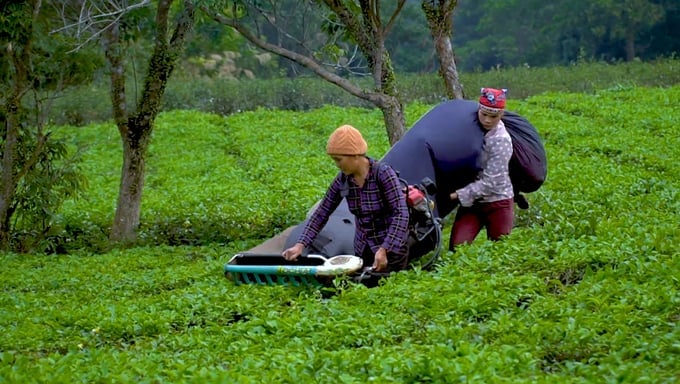
Residents of Hai Ha district utilizing tea harvesting machines. Photo: Nguyen Thanh.
Accordingly, Hai Ha district has encouraged its residents to continue transforming the local tea variety structure, invest in VietGAP-compliant intensive production area, focus on the harvesting of fresh tea buds, and develop the habit of harvesting tea that meets the "1 shrimp 2-3 leaves" standard.
By the end of 2022, nearly 2,000 households in Hai Ha district have produced tea on a total area of 800 hectares, with new tea varieties accounting for more than 74%. The district currently houses approximately 40 hectares of VietGAP-certified tea production area. Thanks to the production of new varieties, Hai Ha tea is more fragrant, flavorful, and easily consumed by the local community.
Mr. Hoang Van Thuong, a large-scale tea farmer in Hai Ha district, shared that in addition to the family labor force, local team farmers hire additional labor for harvesting and transporting tea. This initiative contributes to creating employment opportunities for local workers. The annual yield of tea production on Mr. Thuong's family farm reaches 10 to 12 tons per hectare.
In addition to promoting the expansion of tea production area, Hai Ha district also encourages businesses and individuals to invest in the processing, production, and consumption of tea, thereby supporting businesses in the production process. Furthermore, the district supports businesses and processing facilities in innovating and upgrading technology, with a focus on the processing of premium green tea.
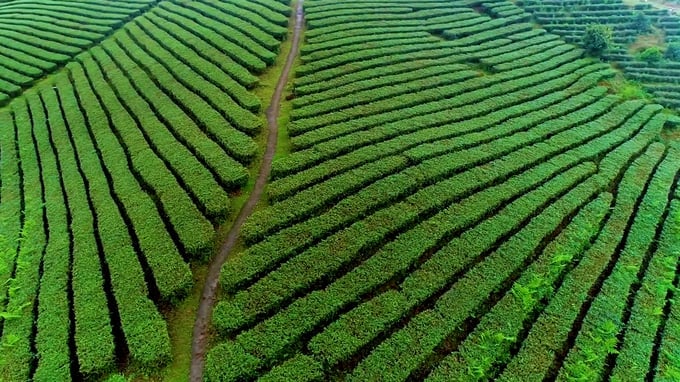
Hai Ha district houses approximately 800 hectares of tea production area. Photo: Nguyen Thanh.
Hai Ha district currently has three tea processing facilities with a daily capacity of 15 tons and eight small-scale processing facilities. The district has successfully transferred four high-quality tea processing technologies since 2022, including the processing technologies for fragrant green tea, green fiber tea, Mao Jian tea, and black tea.
As a result, several processing facilities have successfully produced distinctive products such as high-quality fragrant green tea and green fiber tea, as exemplified by Dung Nga Tea Company and Thang Hoa Tea Company which utilize the Ngoc Thuy, Huong Bac Son and midland tea varieties; Dao Thi Binh Tea Company with black tea products; and Dung Nga Tea Company with several experimental products.
In addition to technology transfer, Hai Ha district has supported production facilities in designing packaging for tea products produced through new production lines and processes. The district has also assisted in registering labels for processing facilities participating in the OCOP program.
Furthermore, Hai Ha district has implemented the construction of a traceability system for product origins. Presently, Dung Nga Tea Company's tea products are OCOP-certified at the provincial level with a 3-star rating. The district has also introduced two new products (tom non tea and black tea) from Dao Thi Binh Tea Company to participate in the OCOP program, both of which have been evaluated and received a 3-star rating.
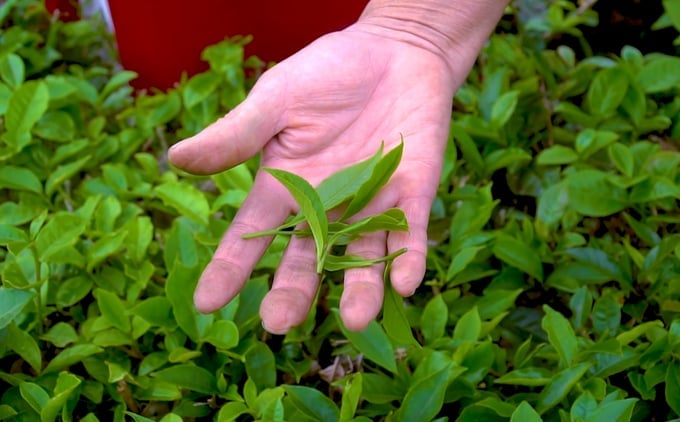
The Hai Ha tea brand is gradually asserting its position through the comprehensive application of technological advances in production and processing. Photo: Nguyen Thanh.
Mr. Tran Sy Dung, Director of Dung Nga Tea Processing Facility, stated that the facility has received extensive support from the district in the innovation of its technology. "In addition to producing raw tea materials for export to the Chinese and Middle Eastern markets, we have also invested in the production of refined products. These refined products have been well-received in both local and out-of-province markets," Mr. Dung shared.
Thanks to technological innovation, Hai Ha tea has established its position on the market. The yield of fresh tea buds in the district has reached nearly 3,000 tons. The upgrading of facilities and processing lines to produce high-quality tea products has also changed the market structure and the purchasing price of fresh materials set by processing facilities.
The market for fresh tea buds is currently maintained at a stable level, with an average price of 6,000 Vietnamese dong per kilogram for midland tea and 8,000 to 10,000 Vietnamese dong per kilogram for Ngoc Thuy tea. As a result, the living standards of residents in the tea production areas of Hai Ha district are rapidly improving.
Hai Ha district has recently shifted its focus on restructuring agriculture towards commodity production to enhance the value of agricultural products and the income levels of local residents. Multiple locally advantageous agricultural products have been formed through the production-supply-consumption chain, contributing to the socio-economic development of the district.
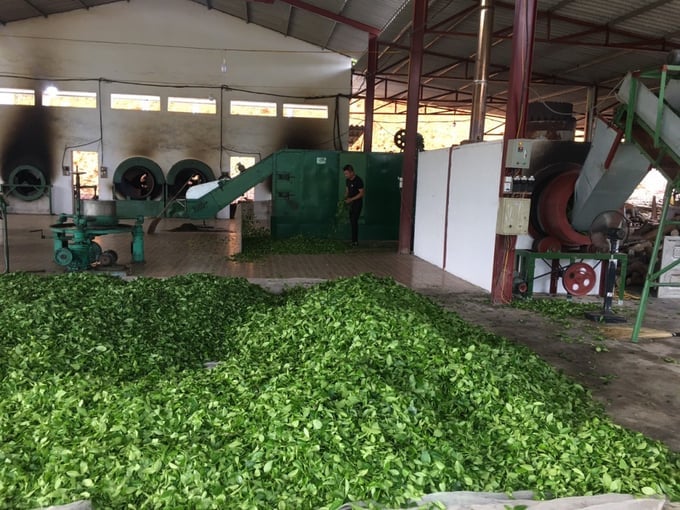
Hai Ha district currently has three large-scale tea processing facilities with a daily capacity of 15 tons. Photo: TT.
Hai Ha district has identified ten key agricultural, forestry, and fishery products that require concentrated investment to promote development, including tea, various vegetables, chicken meat and eggs, pork, white-leg shrimp, mollusks, cage farmed fish, timber, yellow flower tea, and cinnamon. By identifying these key agricultural products, the district has developed and implemented special projects for each product, thereby defining the direction for investment, required budget, and deployment schedule.
Subsequently, Hai Ha district has planned concentrated production areas for crop production, livestock production, and aquaculture. To date, the district has established 17 concentrated production areas for agricultural, forestry, and fishery products following the commodity production chain approach. On the other hand, the district has successfully applied scientific and technological advances to agricultural production, forming and developing farms and production areas in association with the market.
With the aim of developing a local brand, the district has implemented a comprehensive project to develop high-quality concentrated tea production areas since 2016. Namely, the project has deployed models of VietGAP-compliant intensive tea production areas. Additionally, local resources have been allocated for repairing, renovating, and upgrading production facilities.
Additionally, the district has transferred processing techniques and technologies, encouraged the production of new tea varieties, such as Ngoc Thuy, Huong Bac Son, Kim Tuyen, which feature high productivity and quality, and resistance to pests and diseases. Accordingly, tea farmers and businesses have reinforced their cooperation in terms of production, processing, and trading to facilitate stable production volume, quality, and prices for their products.
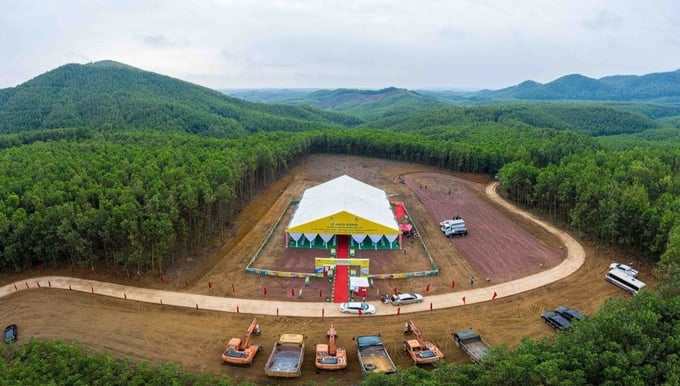
Groundbreaking for the construction of a high-tech livestock farming area in Hai Ha district. Photo: Nguyen Thanh.
In addition, Hai Ha district identifies livestock production as a favorable and potential industry. The district has established both a master and detailed planning for concentrated livestock production areas with a focus on high technology and disease safety in local communes, including planning for the construction of a high-tech livestock production area in the three communes of Quang Son, Quang Thanh, and Quang Chinh.
The district has encouraged and supported local residents in developing efficient and environmentally friendly household livestock production. The district has also established planning for concentrated slaughter points and implemented effective solutions to utilize the livestock slaughter system.
Developing towards commodity production is one of the essential solutions for Hai Ha district to restructure agricultural production, promote key agricultural products, and contribute to the local socio-economic development.
According to the Hai Ha District People's Committee, the total value of local agricultural, forestry, and fishery products has reached 944 billion Vietnamese dong since the beginning of 2023. Additionally, the total production area in the district has reached 3,200 hectares. The local tea production has yielded 4,500 tons of fresh buds. The post-logging reforestation area has reached 330 hectares, and large timber forest areas, encompassing ironwood, ford and mahogany, have reached 19 hectares. Total aquaculture yield has reached 13,000 tons, with 5,300 tons from farming activities.
Translated by Nguyen Hai Long
![Turning wind and rain into action: [9] Digitizing hydrometeorological data in response to climate change](https://t.ex-cdn.com/nongnghiepmoitruong.vn/608w/files/news/2025/06/17/z6704423696987_15fd32ffc26d590d204d520c9dac6786-nongnghiep-165943.jpg)
(VAN) Farmers have begun accessing hydrometeorological applications to adjust their cropping schedules, aiming to ensure productivity and adapt to climate change.
![Turning wind and rain into action: [8] Real-time salinity detection and early warning technology](https://t.ex-cdn.com/nongnghiepmoitruong.vn/608w/files/news/2025/06/17/z6704423696987_15fd32ffc26d590d204d520c9dac6786-nongnghiep-151127.jpg)
(VAN) Thanks to the integration of modern hydrological-hydraulic models, remote sensing technologies, and artificial intelligence, the accuracy of hydrological forecasting has significantly improved.
![Turning wind and rain into action: [7] Early disaster warnings help marine farmers minimize losses](https://t.ex-cdn.com/nongnghiepmoitruong.vn/608w/files/news/2025/06/17/z6704423696987_15fd32ffc26d590d204d520c9dac6786-nongnghiep-142942.jpg)
(VAN) In recent years, thanks to early disaster warnings and forecasting, marine farmers in Khanh Hoa province have been able to reduce risks and losses, thereby improving production efficiency.
![Turning wind and rain into action: [6] ‘Four on-the-spot’ disaster management software](https://t.ex-cdn.com/nongnghiepmoitruong.vn/608w/files/news/2025/06/17/e5a48259d6a262fc3bb3-nongnghiep-183800.jpg)
(VAN) By simply activating the scenario on the disaster management software, the relevant authorities immediately know how many households need to be evacuated, where to evacuate them to, and by what means of transportation…
![Turning wind and rain into action: [5] Hue applies modern technology in disaster forecasting](https://t.ex-cdn.com/nongnghiepmoitruong.vn/608w/files/news/2025/06/17/z6704423696987_15fd32ffc26d590d204d520c9dac6786-nongnghiep-093938.jpg)
(VAN) In Hue city, modern technology has recently been applied in meteorological and hydrological forecasting and warning, helping to reduce the damage caused by natural disasters.

(VAN) A cutting-edge farming technique being implemented on an experimental ranch in Arizona's Sonoran Desert has already saved a billion gallons of water over five years, according to Civil Eats.

(VAN) Poultry and pig production and the environment can be boosted through enhanced water technology, according to new research.